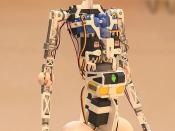Human cloning, a process that has been researched and debated for decades, and for a while the subject of science fiction novels, magazines, and television shows, is today a practical reality. Most recently, through the successful cloning of a sheep from an adult cell, people and scientists alike have been able to acknowledge the fact that human cloning is undeniably possible. As early as 1952, scientists were able to clone certain species of animals, but they were limited to producing the organism only in its embryonic (fetus) stage. Cloning has been in recent news a great deal lately. So let us begin with the basics. Cloning is the genetic reproduction of somatic cells within an organism so that the reproduction contains the exact same genetic information as the parent cell. In laymen's terms, it is a copy. Cloning uses a process called Eugenics which is the replication of host cells (parent) and the creation of matter (clone) using those cells.
Only one cell is needed to create hundreds of copies.
The following pages will go into detail as to why I am against human cloning, the moral and ethical issues regarding human cloning, the laws against cloning in the U.S. and abroad, and the uncertainties involved in cloning. Though the moral and ethical issues involved in cloning are vast, I will briefly discuss only a few.
I don't believe that human cloning will benefit humanity. We already lack the necessary resources to provide for the people around the world. If we introduce clones to our society, our food and petroleum resources will be depleted at a more rapid pace. What will clones do in our society? Take over the workplace and put us out of work? Or will our society revert to a time of slavery, and force labor upon...



Good
a good descriptive essay.
0 out of 0 people found this comment useful.